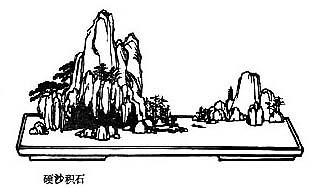Si, réduits au désespoir, ils viennent pour vaincre ou pour périr, évitez leur rencontre. À un ennemi encerclé vous devez laisser une voie de sortie. Si les ennemis réduits à l'extrémité abandonnent leur camp et veulent se frayer un chemin pour aller camper ailleurs, ne les arrêtez pas. S'ils sont agiles et lestes, ne courez pas après eux ; s'ils manquent de tout, prévenez leur désespoir. Ne vous acharnez pas sur un ennemi aux abois.
Amiot
It is a military axiom not to advance uphill against the enemy, nor to oppose him when he comes downhill.
Do not pursue an enemy who simulates flight; do not attack soldiers whose temper is keen.
Do not swallow bait offered by the enemy.1 Do not interfere with an army that is returning home.2
When you surround an army, leave an outlet free.3 Do not press a desperate foe too hard.4
1. Li Ch`uan and Tu Mu, with extraordinary inability to see a metaphor, take these words quite literally of food and drink that have been poisoned by the enemy. Ch`en Hao and Chang Yu carefully point out that the saying has a wider application.
2. The commentators explain this rather singular piece of advice by saying that a man whose heart is set on returning home will fight to the death against any attempt to bar his way, and is therefore too dangerous an opponent to be tackled. Chang Yu quotes the words of Han Hsin: "Invincible is the soldier who hath his desire and returneth homewards." A marvelous tale is told of Ts`ao Ts`ao's courage and resource in ch. 1 of the SAN KUO CHI: In 198 A.D., he was besieging Chang Hsiu in Jang, when Liu Piao sent reinforcements with a view to cutting off Ts`ao's retreat. The latter was obliged to draw off his troops, only to find himself hemmed in between two enemies, who were guarding each outlet of a narrow pass in which he had engaged himself. In this desperate plight Ts`ao waited until nightfall, when he bored a tunnel into the mountain side and laid an ambush in it. As soon as the whole army had passed by, the hidden troops fell on his rear, while Ts`ao himself turned and met his pursuers in front, so that they were thrown into confusion and annihilated. Ts`ao Ts`ao said afterwards: "The brigands tried to check my army in its retreat and brought me to battle in a desperate position: hence I knew how to overcome them."
3. This does not mean that the enemy is to be allowed to escape. The object, as Tu Mu puts it, is "to make him believe that there is a road to safety, and thus prevent his fighting with the courage of despair." Tu Mu adds pleasantly: "After that, you may crush him."
4. Ch`en Hao quotes the saying: "Birds and beasts when brought to bay will use their claws and teeth." Chang Yu says: "If your adversary has burned his boats and destroyed his cooking-pots, and is ready to stake all on the issue of a battle, he must not be pushed to extremities." Ho Shih illustrates the meaning by a story taken from the life of Yen-ch`ing. That general, together with his colleague Tu Chung-wei was surrounded by a vastly superior army of Khitans in the year 945 A.D. The country was bare and desert-like, and the little Chinese force was soon in dire straits for want of water. The wells they bored ran dry, and the men were reduced to squeezing lumps of mud and sucking out the moisture. Their ranks thinned rapidly, until at last Fu Yen-ch`ing exclaimed: "We are desperate men. Far better to die for our country than to go with fettered hands into captivity!" A strong gale happened to be blowing from the northeast and darkening the air with dense clouds of sandy dust. To Chung-wei was for waiting until this had abated before deciding on a final attack; but luckily another officer, Li Shou- cheng by name, was quicker to see an opportunity, and said: "They are many and we are few, but in the midst of this sandstorm our numbers will not be discernible; victory will go to the strenuous fighter, and the wind will be our best ally." Accordingly, Fu Yen-ch`ing made a sudden and wholly unexpected onslaught with his cavalry, routed the barbarians and succeeded in breaking through to safety.
Giles VII.33-36.

 – L'Art de la guerre
– L'Art de la guerre 
